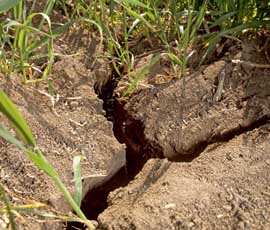Rainfall patterns are changing, confirms survey

Rainfall patterns are changing, suggests a survey, with 89% of farmers recording differences in precipitation over the last five years – in pattern as well as level.
Some 62% of farmers have recorded changes in rainfall levels. The greatest decreases have been in eastern England, the Midlands, Yorkshire and Humberside.
But it is a different story in north-east and north-west England, where a greater percentage of farmers have noticed an increase as opposed to a decrease in rainfall levels.
At the same time, 73% of farmers have noticed a change in rainfall patterns. They believe rainfall is becoming more erratic and unpredictable, with longer periods of wet or dry weather.
This is giving rise to wetter summers but drier winters and springs, the survey suggests. And when it does come, rain falls increasingly in heavy downpours rather than steadily.
The survey was conducted by the Royal Agricultural Society of England as part of its programme to help farmers manage soil and water resources against the background of climate change.
RASE chief executive Denis Chamberlain said the results would be used to fine tune a soil and water conference at Stoneleigh this autumn. It would be followed by a series of practical regional farm events in 2013.
The biggest challenge facing farmers over the next few years was lack of rain or the rain not falling at the right time, said Mr Chamberlain. “We need to help farmers plan for these challenges,” he said.
One in five farmers felt they would benefit from investment in water storage facilities in the immediate future. Some 39% said they needed to invest either now or in near future in irrigation or water storage equipment
Challenges for arable farmers included poor crop establishment, lower growth and reduced yields, problems adapting to different harvest timings and an increased amount of grain to be dried.
Challenges for livestock producers included shortages of grass and problems with hay and silage making. Compaction, waterlogging and poaching were the biggest soil related problems.
Almost one in four farmers reported drainage problem, especially in north-east England. Problems included flooding, waterlogging and ponding caused by blockages, collapses, drains unable to cope and the need for maintenance.
Maps: a decade of weather extremes
Join the forum on drought and weather
Special pages on drought

